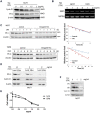Tongshu capsule down-regulates the expression of estrogen receptor α and suppresses human breast cancer cell proliferation
- PMID: 25101695
- PMCID: PMC4125192
- DOI: 10.1371/journal.pone.0104261
Tongshu capsule down-regulates the expression of estrogen receptor α and suppresses human breast cancer cell proliferation
Abstract
The Tongshu Capsule (TSC) is a prevalent form of traditional Chinese medicine widely used for its purported effects in treating mammary gland hyperplasia and inflammation. Though successful in several clinical studies, there is no clear evidence as to why TSC has a positive treatment effect, and little known about underlying mechanism that may account for it. In this study, we examined the effects of TSC and found that it has a comparatively strong growth inhibition on ERα positive breast cancer cells. TSC seems to cause G1 cell cycle arrest instead of apoptosis. Interestingly, TSC also down-regulated the expression of ERα and Cyclin D1. Consistently, TSC suppressed E2 mediated ERα downstream gene expression and cell proliferation in ERα positive breast cancer cell lines MCF7 and T47D. Depletion of ERα partially abolished the effects of TSC on the decrease of Cyclin D1 and cell viability. Our findings suggest that TSC may have therapeutic effects on ERα positive breast cancers and moreover that TSC may suppress breast epithelial cell proliferation by inhibiting the estrogen pathway.
Conflict of interest statement
Figures





Similar articles
-
Bisphenol S promotes the cell cycle progression and cell proliferation through ERα-cyclin D-CDK4/6-pRb pathway in MCF-7 breast cancer cells.Toxicol Appl Pharmacol. 2019 Mar 1;366:75-82. doi: 10.1016/j.taap.2019.01.017. Epub 2019 Jan 23. Toxicol Appl Pharmacol. 2019. PMID: 30684532
-
Benzopyran derivative CDRI-85/287 induces G2-M arrest in estrogen receptor-positive breast cancer cells via modulation of estrogen receptors α- and β-mediated signaling, in parallel to EGFR signaling and suppresses the growth of tumor xenograft.Steroids. 2013 Nov;78(11):1071-86. doi: 10.1016/j.steroids.2013.07.004. Epub 2013 Jul 26. Steroids. 2013. PMID: 23891847
-
RASSF1A inhibits estrogen receptor alpha expression and estrogen-independent signalling: implications for breast cancer development.Oncogene. 2012 Nov 22;31(47):4912-22. doi: 10.1038/onc.2011.658. Epub 2012 Jan 23. Oncogene. 2012. PMID: 22266866
-
Annonacin induces cell cycle-dependent growth arrest and apoptosis in estrogen receptor-α-related pathways in MCF-7 cells.J Ethnopharmacol. 2011 Oct 11;137(3):1283-90. doi: 10.1016/j.jep.2011.07.056. Epub 2011 Aug 4. J Ethnopharmacol. 2011. PMID: 21840388
-
Cyclin D1 determines estrogen signaling in the mammary gland in vivo.Mol Endocrinol. 2013 Sep;27(9):1415-28. doi: 10.1210/me.2013-1065. Epub 2013 Jul 17. Mol Endocrinol. 2013. PMID: 23864650 Free PMC article.
Cited by
-
The therapeutic effect of traditional Chinese medicine on breast cancer through modulation of the Wnt/β-catenin signaling pathway.Front Pharmacol. 2024 May 9;15:1401979. doi: 10.3389/fphar.2024.1401979. eCollection 2024. Front Pharmacol. 2024. PMID: 38783943 Free PMC article. Review.
-
Mechanisms of CDK4/6 Inhibitor Resistance in Luminal Breast Cancer.Front Pharmacol. 2020 Nov 16;11:580251. doi: 10.3389/fphar.2020.580251. eCollection 2020. Front Pharmacol. 2020. PMID: 33364954 Free PMC article. Review.
References
-
- Santen RJ, Mansel R (2005) Benign breast disorders. New England Journal of Medicine 353: 275–285. - PubMed
-
- Allegra JC, Lippman ME, Green L, Barlock A, Simon R, et al. (1979) Estrogen receptor values in patients with benign breast disease. Cancer 44: 228–231. - PubMed
-
- Key T, Appleby P, Barnes I, Reeves G (2002) Endogenous sex hormones and breast cancer in postmenopausal women: reanalysis of nine prospective studies. Journal of the National Cancer Institute 94: 606–616. - PubMed
Publication types
MeSH terms
Substances
LinkOut - more resources
Full Text Sources
Other Literature Sources
Medical
Research Materials
Miscellaneous

